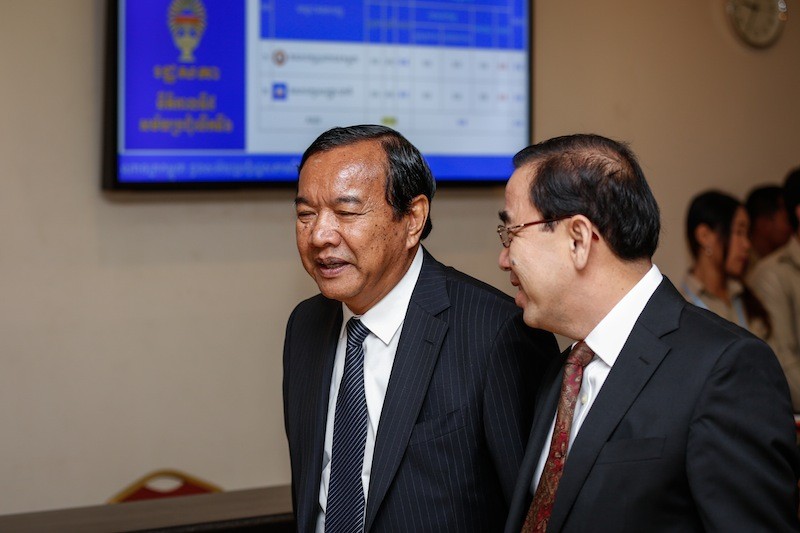Long-serving Foreign Affairs Minister Hor Namhong was replaced by erstwhile Telecommunications Minister Prak Sokhon, and Commerce Minister Sun Chanthol was transferred back to his old transportation portfolio on Monday as a raft of changes to Prime Minister Hun Sen’s cabinet were approved in the National Assembly.
In a vote that began at 10:30 a.m., 70 lawmakers among the 107 attending the session approved 26 cabinet changes, including the retirement of Deputy Prime Minister Keat Chhon, who first served in government as Prince Norodom Sihanouk’s minister of industry and commerce in the 1960s.

Along with Mr. Sokhon taking over the Foreign Affairs Ministry, the Assembly also approved the appointment of outgoing Transport Minister Tram Iv Tek as minister of posts and telecommunications and former Commerce Ministry Secretary of State Pan Sorasok as Mr. Chanthol’s replacement.
Outgoing Land Management Minister Im Chhun Lim, who was replaced by Chea Sophara, the former minister of rural development, was revealed as a new member of the Constitutional Council of Cambodia.
Before the vote, Mr. Hun Sen sarcastically offered his appreciation for the opposition CNRP’s announcement Sunday night that it would vote against the cabinet reshuffle due to the near absence of any new faces.
“I’d like to take this opportunity to express thanks to the CNRP’s members who said they would not vote to support,” Mr. Hun Sen said.
“Thanks so much because the CPP does not need your votes,” he added. “If you voted [in favor] it would have made the CPP in debt to your excellencies.”
Yet with the CPP only having 68 lawmakers in the 123-member Assembly, it was evident after the vote that at least two opposition lawmakers had joined the CPP voting in favor of the changes, marking the first time CNRP lawmakers have clearly defied a public party position.
Opposition spokesman Yim Sovann said by telephone after the vote, which was secret, that there would be no recriminations inside the party against its members of parliament (MPs).
“The CNRP is a democratic party, and the MPs have the right to express their opinion. This is the freedom of this party,” he said. “If they think it’s right to vote in favor, it’s their right; we cannot force them like other parties.”
Along with eight ministerial changes in the cabinet reshuffle were more than a dozen additions to the executive branch, including the appointment of former National Election Committee (NEC) Chairman Im Suosdey as a “senior minister in charge of special missions.”
Despite being widely criticized for his oversight of the 2003, 2008 and 2013 national elections, Mr. Suosdey has long defended his neutrality.
Committee for Free and Fair Elections executive director Koul Panha said the appointment of Mr. Suosdey as a senior member of Mr. Hun Sen’s government substantiated doubts about the elections he ran.
“It confirms what people doubted about the NEC and the ruling party because this position is as a political officer of the government as a senior minister,” Mr. Panha said, noting that the NEC was widely considered to be controlled by the CPP.
“Before, this mechanism was under the ruling party, so they could nominate someone who would nominate them. It confirms what the public did not trust [about the NEC], and it proves he was very closely affiliated to the party.”
Mr. Suosdey was ousted as NEC chairman last year when a new election committee was established in April with equal representation from both the CPP and CNRP in accordance with the July 2014 political deal. Former CPP lawmaker Sik Bunhok now serves as NEC chairman.
By telephone, Mr. Suosdey declined to comment on whether his appointment to the government would raise questions about his partiality. “I have no comment. Why are you asking me this?” he said.
Mr. Namhong’s removal as foreign affairs minister marks the first change in that portfolio since November 1998, when he replaced Ung Huot, who served as both foreign minister and first prime minister after replacing Prince Norodom Ranariddh.
Mr. Chhon’s retirement also marked the end of an era, with the outgoing deputy prime minister having served in every government in Cambodia’s post-colonial period except for the U.S.-backed Lon Nol regime, which he opposed during the 1970s civil war.
Besides serving as industry minister in the 1960s, Mr. Chhon served as Pol Pot’s interpreter after 1975. He defected from the Khmer Rouge to Mr. Hun Sen’s regime in the mid-1980s and replaced now-opposition leader Sam Rainsy as finance minister in 1994, serving until 2013.




